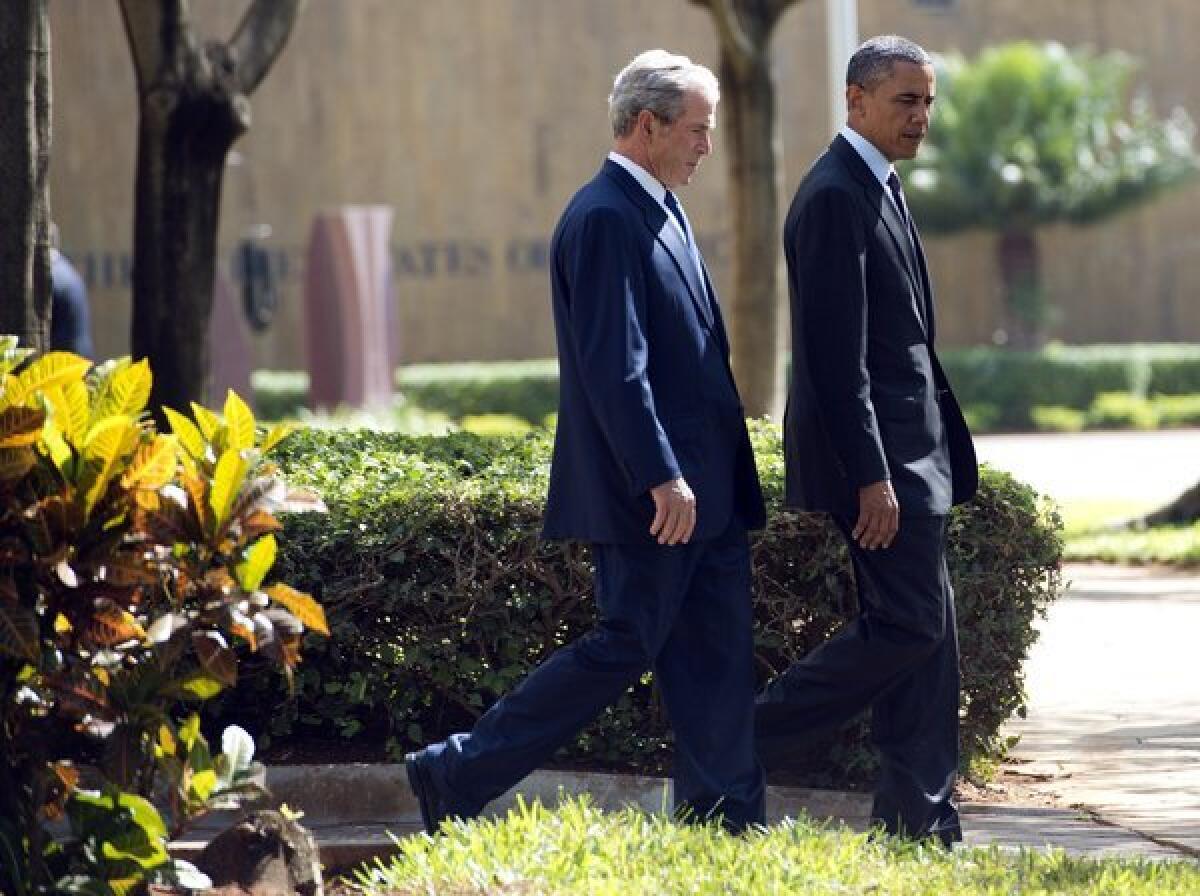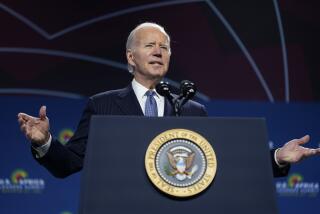In a strange political collision, Obama and Bush meet in Africa

DAR ES SALAAM, Tanzania – As he visited sub-Saharan Africa this week, President Obama often found himself in his predecessor’s shadow. Then, on Tuesday, George W. Bush was at Obama’s side.
Obama and the former president stood together to honor the victims of the 1998 bombing of the U.S. Embassy here, a terrorist attack that killed 11 people and wounded scores more.
The scene made for a strange presidential collision 8,000 miles from Washington and only a few years from the days when Obama railed daily against Bush and his policies. But in this still-developing outpost on the Indian Ocean, the two men shared a moment.
Standing at a memorial to the victims, a large block of stone shaded by a tree outside the new embassy building, Obama and Bush bowed their heads in silence. The words of another former president, Bill Clinton, marked a plaque nearby: “We must honor the memory of those we mourn by pressing the cause of freedom and justice for which they lived. It is the burden of our history and the bright hope of the world’s future.”
A Marine laid a wreath at the site and the men paused in silence. The two presidents made no remarks.
The Republican former president was visiting East Africa for a meeting of first ladies hosted by his wife, Laura Bush. The event is part of AIDS relief and development work the couple began in the White House and have continued since. First Lady Michelle Obama attended the event Tuesday. Obama was wrapping up his first major tour of Africa, a trip aimed at defining his own legacy on the continent he has been accused of neglecting.
It was far from the first time Bush – or his legacy – had emerged on Obama’s African tour. Bush’s AIDS-relief program has become a model for successful, grand-scale development work and presidential legacy-making. As he announced his own, smaller initiatives, Obama was mindful that his efforts could not match Bush’s financial investment, given the budget battles he’s already facing with Congress.
Before leaving Tanzania on Tuesday to return to Washington, Obama touted his $7-billion plan to upgrade power infrastructure in Africa, where nearly two-thirds of the population has no access to electricity. Obama visited the Ubungo power plant, a once-shuttered facility that was reopened with help from the Millennium Challenge Corp., a Bush-era grant program, and private investors.
“I’m absolutely convinced that, with the right approach, Africa and its people can unleash a new era of prosperity,” he said. “That’s what all our efforts are going to be about – is making sure that Africans have the tools to create a better life for their people, and that the United States is a partner in that process.”
Obama’s “Power Africa” program aims to expand such efforts, he said. Obama said the United States would also support smaller projects, such as the development and distribution of the “Soccket” ball, a soccer ball that stores electricity created by kinetic energy and can power a reading light.
“And you can imagine this in villages all across the continent,” he said.
ALSO:
Insurgent attack on Kabul guesthouse for U.S. personnel kills 8
Snowden accuses Obama of ‘deception,’ punishing him with exile
Egyptian leader appears to reject army’s ultimatum to deal with crisis
kathleen.hennessey@latimes.com
Twitter: @khennessey
More to Read
Sign up for Essential California
The most important California stories and recommendations in your inbox every morning.
You may occasionally receive promotional content from the Los Angeles Times.











